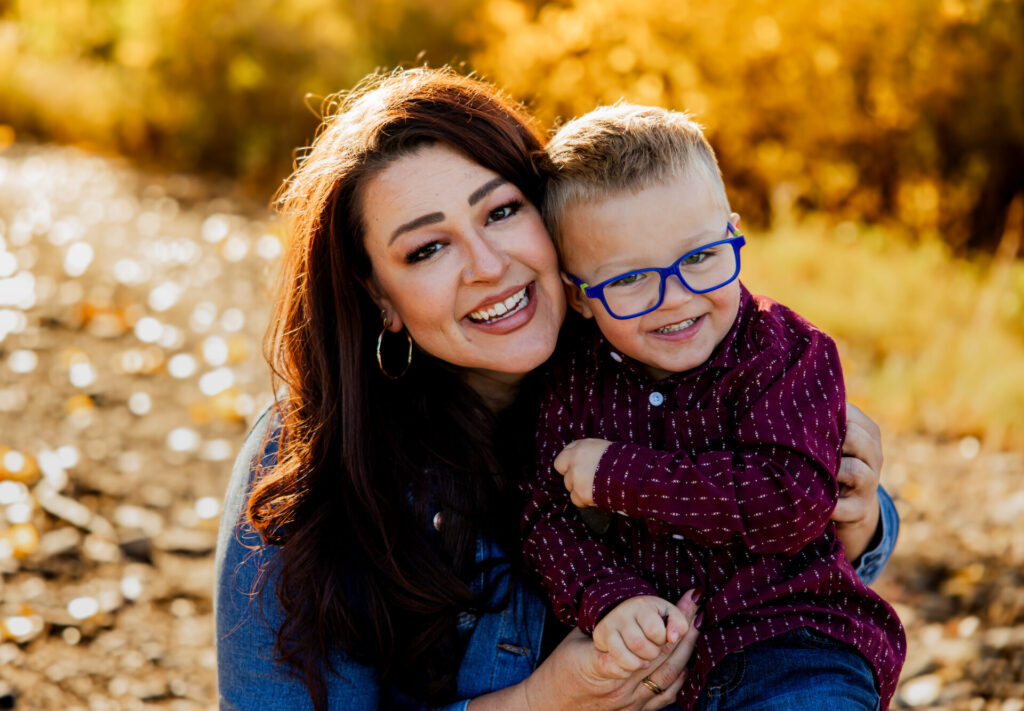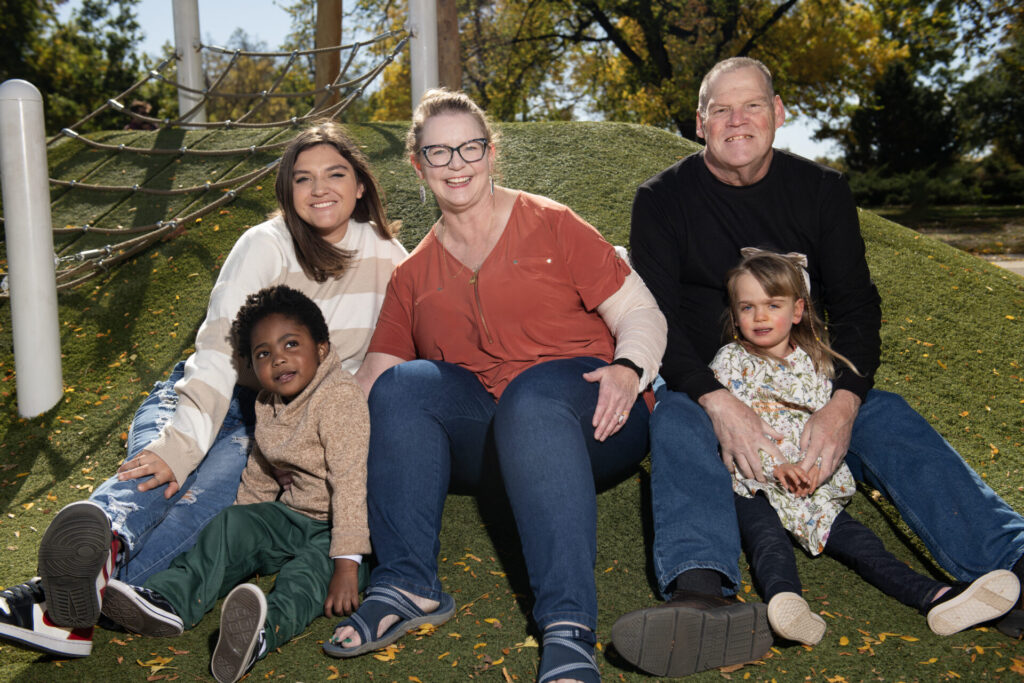Have a passion for helping kids in foster care with complex needs? Consider becoming a treatment or therapeutic foster parent.

Jessica Kimak has a knack for supporting teens and parents who are struggling. With a bachelor’s degree in Psychology and a master’s degree in Social Work, Jessica has provided therapy for children and youth at residential treatment centers, hospitals and schools. She was interested in becoming a foster parent and attended an information session where she learned of a treatment foster care pilot program in Denver County. It’s been nearly six years since she became certified to provide treatment foster care, and while it isn’t easy, she finds it incredibly rewarding.
“I became a treatment foster care provider because I had worked with teens and saw they needed an adult that understands them. Any additional positive adult in their life is a benefit, said Jessica. “My hope is that their experience in my home gives them a sense that there’s someone safe and nurturing that understands them, hears them and is on their team. That’s my purpose and my role.”
When a child or youth cannot safely stay in their home, county child welfare agencies strive to first find kinship placements with family or people with whom they have an established relationship. When that is not possible, a foster parent offers a safe and temporary home with the goal of reunification.
Historically, children and youth in out-of-home placements who need a higher level of care and treatment often would live in a congregate care setting, such as a residential treatment center or group home. With the passage of the Family First Prevention Services Act of 2018 (Family First) – the most significant change to child welfare in decades – Colorado and other states have shifted their approach to foster care. For the first time, local child welfare agencies are able to use federal funding to provide additional services and resources that help counties keep kids safely with their families and avoid out-of-home placement. Family First encourages care in a family-like setting or, if necessary for a short time period, care in a congregate setting designed to meet specialized treatment needs. It also helps ensure children and youth are placed in the least restrictive, most family-like setting appropriate when foster care is needed.
Because children and youth have better outcomes when they live in a home setting, Colorado’s child welfare agencies strive to provide that higher level of care in a home rather than a congregate care setting. This is known as therapeutic foster care or treatment foster care, based on the level of care required. In treatment foster care, children and youth with high levels of emotional, behavioral or mental health needs receive treatment from a highly trained foster parent in a home. Treatment foster care providers typically care for one child or youth at a time but can have up to two youth in care in their home.
Therapeutic Foster Care serves children and youth who have a slightly lower level of need than those in treatment foster care. Therapeutic foster care providers can care for up to six children and youth in their home at one time (this includes any adopted or biological children living in the home).
Colorado needs more therapeutic and treatment foster families. As of April 2024, there are 2,573 children and youth living with Colorado’s 2,067 certified kinship and foster families.
SAFY is a foster care agency in Colorado that trains and certifies foster families and helps to place children and youth from all 64 counties in certified foster homes. Recently, the agency has been receiving an average of 70 referrals each week for kids who need a home and they are seeing a trend of more than half of those kids – 40 to 45 – requiring a higher level of care.
“There are hundreds of youth in congregate care in Colorado and while this allows for more intense treatment of their complex needs, those settings are meant to be temporary and help stabilize them, not raise them,” said Carley Clark, Foster Parent Recruiter and Placement Coordinator at SAFY. “When they leave those residential facilities, they need a home to go to where they can continue receiving treatment or therapy. Kids belong with families and parents and in homes with bedrooms.”
Anyone who can become a traditional foster parent can become a therapeutic or treatment foster parent with additional training and experience. Because caring for children and youth with complex needs draws on additional skills, typically experienced foster parents and individuals with a background in education, mental health, law enforcement, residential treatment or medical fields are well-suited to the role. While experience in these fields can prove invaluable to individuals who want to become treatment or therapeutic foster care parents, committed adults aren’t required to have a specific background to provide these levels of care.
“Treatment foster care, specifically, is a good option for someone with a background as a therapist, working with higher needs kids or in a residential setting,” said Jessica. “Working with these kids comes naturally to us too; we’re not scared of the behaviors.”
Alan Nichols’ professional career has been dedicated to child welfare. Seven years ago, after seeing many teens go into residential treatment facilities, often because there was not a foster home available, he decided he had the capacity to help and became a single foster dad. He eventually became certified as a therapeutic foster care provider and draws upon the skills he learned while working in a congregate care facility to help the teens in his care with their behaviors. “We all have skills that help us navigate many things in our life and it’s about using those skills in this role,” said Alan. “It helps to look at the bigger picture. You can’t sweat the small stuff.”
In Colorado, therapeutic and treatment foster parents undergo extensive training to ensure they are equipped to provide intensive caregiving and support needed. Treatment foster care providers receive an additional 32 hours of training and weekly visits from their support workers, while therapeutic foster care providers receive an additional 12 hours of specialized training and bi-weekly visits from their support team. In addition to the intensive initial training, therapeutic and treatment foster parents are always learning through continuing education opportunities offered by county child welfare departments, and child placement agencies.
These therapeutic and treatment foster care providers and the children and youth they care for also have access to additional services and resources – both inside and outside the home – to meet the needs of the child or youth including 24/7 support line. In Denver County, for example, treatment foster parents are assigned a support worker, in addition to their caseworker, who provides intensive case management services such as in-home team meetings with the full treatment team. Therapeutic and treatment foster parents who are certified and trained by SAFY also have a dedicated support worker that serve as a home assistant as well as a network of respite care providers.
It’s a time-intensive role that requires a lot of patience – and juggling! A typical treatment or therapeutic foster parent will spend a fair amount of time coordinating schedules, meeting with caseworkers, driving to appointments and accessing services for the child or youth in their care. If that sounds like a full-time commitment, it’s because it is. The state of Colorado ensures treatment and therapeutic foster parents have the means they need to provide for the children and youth in their care, receiving funds to reimburse them for the expenses involved with caring for them.
Ultimately, therapeutic and treatment foster parents play a critical role in supporting children and youth as they heal from trauma with the goal of reunification. Lauralyn Sullivan, a treatment foster care provider in Denver County, put it this way, “It’s not about adding more kids to my family. It’s about being a part of their family.”
The following organizations train and certify parents for treatment and/or therapeutic foster care. To learn more, visit:
- Adams County
- Ariel Clinical Services
- Denver County Human Services
- Envoi Associates
- Family Resource Network
- Hope & Home
- Kids Crossing
- La Plata County Human Services
- SAFY Specialized Alternatives for Children and Youth
- Savio House
- Smith Agency
- Special Kids Special Families
- Weld County Human Services
More Posts







